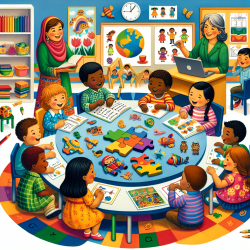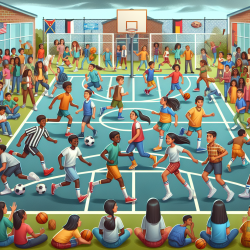As a speech-language pathologist dedicated to improving outcomes for children, it's crucial to leverage data-driven insights to enhance your practice. The research article "Emergent Literacy Skills of Preschoolers with Language Disorders: Monolingual English versus Dual Language Learners" provides valuable findings that can be integrated into your work to better support preschoolers with language disorders.
The study explored the emergent literacy skills of preschoolers with specific language impairment (SLI), comparing monolingual English speakers to dual language learners. Key emergent literacy skills examined included print knowledge, phonological awareness, and narrative production. The study found no significant differences between the two groups on formal or informal measures of emergent literacy, indicating that dual language learners are not at a disadvantage compared to their monolingual peers.
Implementing Research Findings in Practice
Here are actionable steps to integrate these findings into your practice:
- Use Parent Questionnaires: The study highlighted the usefulness of parent questionnaires in assessing emergent literacy skills. Incorporate early literacy questionnaires into your assessment protocols to gather comprehensive information from parents about their children's literacy skills and home literacy practices.
- Focus on Print Knowledge and Phonological Awareness: Both monolingual and dual language learners showed similar levels of print knowledge and phonological awareness. Ensure that your interventions include activities that enhance these skills, such as letter-sound correspondence games and rhyming activities.
- Encourage Narrative Skills: The study found no significant differences in narrative production between the two groups. Use storytelling and narrative retelling activities to support the development of narrative skills in all children, regardless of their language background.
- Engage Parents: Parents' ratings were significantly correlated with standardized measures of emergent literacy. Encourage parents to engage in literacy-related activities at home, such as shared book reading and discussions about environmental print.
Encouraging Further Research
While this study provides valuable insights, it also underscores the need for further research. Encourage your colleagues and peers to explore the following areas:
- Longitudinal Studies: Conduct longitudinal studies to track the development of emergent literacy skills in dual language learners and monolingual children over time.
- Larger Sample Sizes: Replicate the study with larger sample sizes to validate the findings and explore additional variables that may influence emergent literacy skills.
- Diverse Language Backgrounds: Investigate the emergent literacy skills of children from diverse language backgrounds to better understand the impact of different languages on literacy development.
By implementing these research findings and encouraging further studies, we can continue to improve the outcomes for preschoolers with language disorders. To read the original research paper, please follow this link: Emergent Literacy Skills of Preschoolers with Language Disorders: Monolingual English versus Dual Language Learners.










